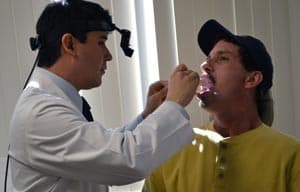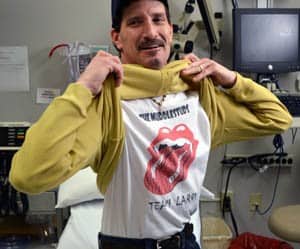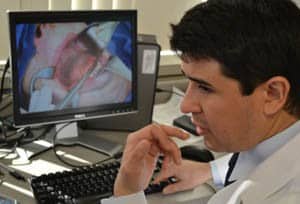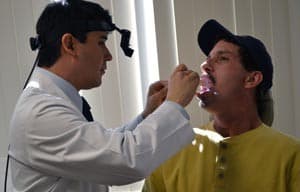Tongue Cancer Doesn’t Slow Drummer’s Beat

Larry Massanet shows off a supportive “Team Larry” T-shirt given to him by his bandmates in “The Muddlestuds.”
| The rock’n’roll lifestyle doesn’t allow a nagging sore on your tongue to slow you down, and it surely isn’t a very “punk-rock” detail to complain about.
After all, Larry Massanet, 42, still had unhampered use of two thundering arms to pummel his drum kit with while keeping beat in two active bands in which he plays. The backbeat and life’s other intricacies weren’t slowing down, and he figured the sore would eventually heal on its own.

Larry Massanet shows off a supportive “Team Larry” T-shirt given to him by his bandmates in “The Muddlestuds.”
But as the days of having a sore tongue turned into weeks and eventually months, he and his wife, Hila, decided it was time for him to see a doctor. Unfortunately, the outcome was what the couple feared most.
“The sore on my tongue wound up being diagnosed as cancer,” Massanet said. “I guess if there’s a lesson in all of this, I probably should have gone to see a doctor right away.”
After being referred to Mauricio Moreno, M.D., a head and neck surgeon in the UAMS Department of Otolaryngology – Head and Neck Surgery, Massanet learned the tumor needed to be removed. That meant removing the majority of his tongue.
“I didn’t quite know what to expect there right away,” Massanet said. “But Dr. Moreno was unbelievable from the start and I knew I was in good hands.”

Mauricio Moreno, M.D., explains the successful free-flap reconstructive surgery he completed on Larry Massanet.
Moreno specializes in free-flap reconstructive surgery, which
allowed the removal of a large portion of Massanet’s cancerous tongue and the rebuilding of a new, mostly functioning one.
After removing about 80 percent of Massanet’s tongue, Moreno took a “flap” of skin from Massanet’s thigh that he was then able to reshape to the size of Massanet’s tongue. The flap contained active blood vessels that he then “rewired” under a microscope to help it flourish and function in its new location.
“Having this reconstructive ability allows us to take on really extensive tumors,” he said. “But most importantly, functionally these patients do well — they can eat and talk — which means that patients can return to their normal life once the treatment is completed.”
Though it was difficult immediately following the surgery and undergoing radiation treatments, Massanet now has the ability to talk fand taste and chew food.
“The hardest part is still learning how to move it around when I talk,” he said. “There are some letter combinations I still have trouble with, but it’s getting easier.”
He was previously a smoker, as was his wife, Hila, and they’ve both since quit and hope it trickles down to family and friends.
“It’s a wake-up call when something like this happens,” Hila Massanet said. “Things happen for a reason and we’re lucky to have such a happy ending. Not everyone is that lucky.”
Moreno said Massanet has limited sense of taste, but that’s the best-case scenario in a procedure like this.
“He has some taste sensation because he has almost 20 percent of his tongue posteriorly and there are taste buds in that area,” Moreno said. “He does not have any taste sensation originating from the new flap tissue. In the long term, the flap can develop some degree of sensation, such as tactile and pressure, but tasting will never develop in that tissue.”
Massanet took a brief hiatus from playing the drums during his procedure, but is now back in full force playing with both bands on a regular basis.
“I’m really amazed at what Dr. Moreno was able to do to help me,” he said. “I give all the credit for getting through this to my wife, friends, family and the medical experts at UAMS who were all amazing.”
